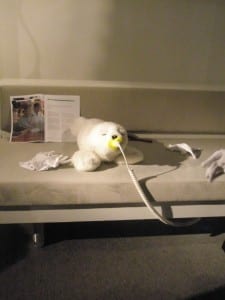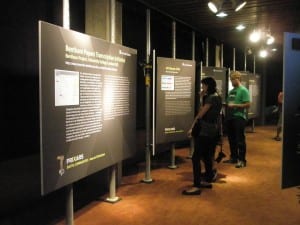A full day today to explore the offerings at this year’s festival, which began in overcast fashion but later exploded into brilliant sunshine.
It seemed natural to begin at Ars Electronica’s bustling HQ, sited on the other side of the Danube from where I’m staying. Exhibits included computer games programmed by under-19s in the ‘Create Your World’ festival-within-the-festival, An installation describing the work of CERN and, the one I found particularly fascinating, the Robotinity gallery. This included all manner of things, from scuttling insect-like robots, to machinery which visualises letters by scanning brain activity, to the latest in prosthetics.


Standing out, though,were two outwardly different, though fundamentally similar robots. The first, a cuddly baby seal which reacts to being stroked by flicking its tail, opening its eyes, and generally being adorable. The second is a child like rubbery thing, answers almost any question you might ask it; when it cocks its head to one side and appears to focus its oddly knowing gaze on you, it’s very disconcerting.
From there, it was to the Offenes Kulturhaus, for the Cyberarts 2011 exhibits. Favourites here were a fog-generating machine able to create a cloud thick enough that you quite literally can’t see your hand in front of your face, and ‘Pigeon D’Or’, in which pigeons were fed with an entirely harmless bacterial culture so that their excrement becomes a disinfectant. Wonders never cease.
The last part of the day – and undoubtedly the highlight – was attending the Ars Electronica Gala at the Brucknerhaus on behalf of the Bentham Project. The Gala began and ended with two stunning performances. First was Alex Roman’s film ‘The Third and the Seventh’ (an Award of Distinction winner), which was utterly spellbinding (made even more powerful by the Michael Nyman soundtrack); and the evening was rounded off by members of the Vienna Philharmonic Orchestra giving a world premiere performance of Ralph Schutti’s ‘Beautiful Music for a Beautiful Beast’, written to honour the Large Hadron Collider.
In between was the main purpose of the evening: the presenting of the winning entries in the seven categories of the Prix Ars Electronica with their Golden Nicas. There were some very inspiring projects on show. The Digital Communities winner – the category in which we received our Award of Distinction – was the Fundación Ciudadano Inteligente (Smart Citizen Foundation), a non-profit organisation which promotes transparency and accountability in South American politics; elsewhere the Choke Point Project, who are attempting to map the internet’s nodes of control in order to prevent governments from simply switching off the internet at times of civil disobedience, as we saw earlier this year in Egypt. Others were more challenging: in May the Horse Live in Me, the artist was gradually immunised with horse blood, before being injected with a full vial without going into anaphylactic shock, the animal and human blood joining together.
It was a genuine honour to attend the Gala. I now just have one question: can I come every year?
 Close
Close








